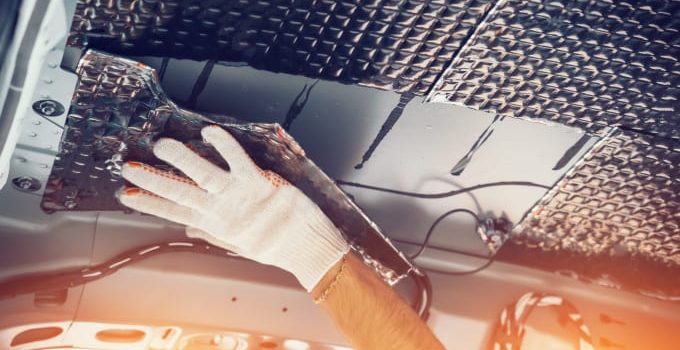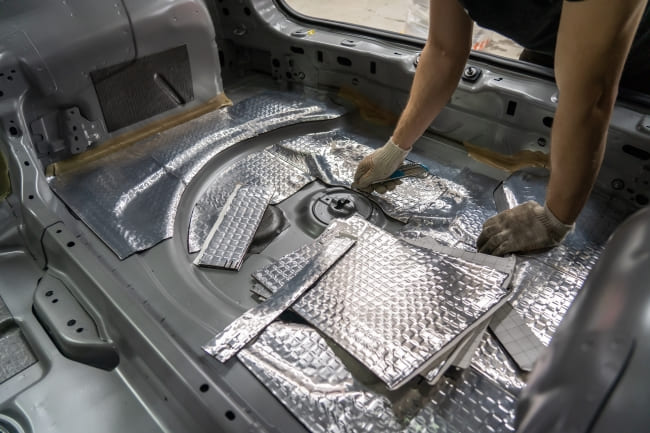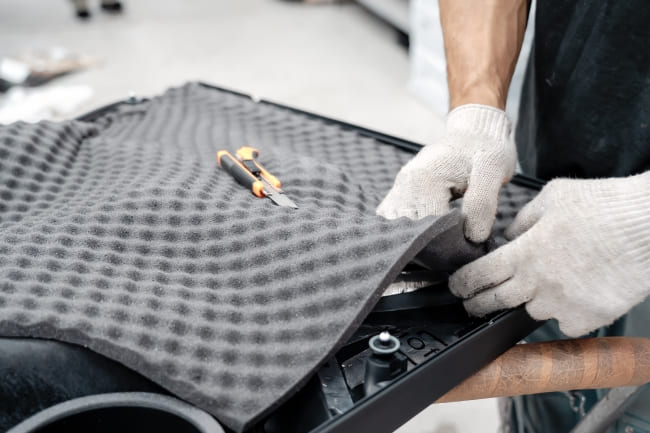
When driving, noise can enter the interior for a variety of reasons. This is not always very pleasant for many drivers, especially when conversations with passengers are drowned out and the radio can hardly be understood. If this is the case, the need to do noise insulation in the car may arise. This can be achieved with the help of soundproofing. However, vehicle noise insulation is not only so important for your own comfort, but is also proactively required by the legislator. This specifies how loud engines and other components can be. On longer journeys, a lack of soundproofing can have a negative impact on driver safety, as high noise levels affect concentration and cause headaches. But first of all it has to be clarified for what reasons disturbing noises can occur in the car that generate such volume that they have a restrictive effect on traffic.
Contents
Why can it be so loud in the car become?
Driving noises are essentially normal – as long as they are not disproportionately loud. After all, the car's engine, wheels and transmission are constantly in motion. On the one hand, noise is transmitted by the mechanical parts, but it is also caused from outside by the airstream. However, loud roaring and groaning are not always due to poor sound insulation: a well-trained ear will perceive unusual noises from the car; however, caution is advised here. In order to identify the cause of the noise, all systems should be switched off if possible and the further journey should be postponed for the time being. Soundproofing is not an alternative to repairs here; the problem should then be rectified in a workshop.
Striving to implement the requirements of the legislator and to meet customer requirements for comfort and driving dynamics, car manufacturers often have to make deductions with regard to the materials that would insulate the driving noise of the car. Increasingly strict environmental protection regulations require, among other things, a reduction in the curb weight of cars. Inadequate soundproofing of the interior is therefore a common annoyance among drivers. External factors such as a bumpy, poorly laid road as well as weather conditions can cause unpleasant noise inside the car, but they are unavoidable. Nevertheless, there are some ways to gently reduce the noise level of internal and external factors, at the same time to comply with the legislator's specifications and ultimately to reach your destination safely. More on that below.
What to do about noise in the car?

Most of the noise penetrates through the floor, the car doors and the wheel arches. A sound-insulating car floor can already provide a great remedy here. In principle, however, the following areas are particularly important to insulate the driving noise of the car: If doors, trunk and tailgate, floor and wheel housings are soundproofed, the quality of the driving experience increases again – the sound of the sound system improves, road noise is significantly reduced and also the noise of the mechanical components of the vehicle is noticeably reduced, such as tire or engine noise. Should rain and hailstorms be announced, roof insulation ensures a pleasant journey in all wind and weather conditions. In order not to have to do without daily driving comfort, given the nature of some roads, a soundproof mat made of insulating foam can be installed in the car. If you want to improve the sound of the stereo system, focus on the isolation of the rear part of the cabin. Today there are highly effective products for sound insulation in cars, so that retrofitting is possible without any problems – the materials required differ in their composition depending on the area of application.
Sound insulation or – Damping?

Soundproofing basically means the acoustic separation of rooms and is of particular relevance for the insulation of the vehicle, because the aim is to prevent sound from getting from one area to another. The propagation of airborne and structure-borne noise is to be blocked by means of sound-insulating measures, in that a surface reflects the sound waves. In the case of soundproofing, on the other hand, the aim is to prevent sound propagation through absorption. The focus here is on positively changing the room acoustics and reducing potential reverberation. Both measures require different materials: if insulation is to be achieved, heavy acoustic foam is usually used, while soft foam is used for damping. Basically, materials that reduce body vibrations, reflect sound waves to keep them from penetrating, and dampen external sound waves are excellent for good insulation. The best effect can be achieved by insulating the interior surfaces of the car. It goes without saying that only high-quality materials should be used. Whether the vehicle needs sound insulation or damping depends entirely on the noise-generating noise sources.
As is so often the case, it is important to go to a specialist workshop to improve the noise insulation in the car. This ensures that all changes take place within the framework of what is permitted, because sound insulation that goes so far that important ambient noises are no longer perceived can be dangerous. Vehicle noise can also indicate a problem with the car, as mentioned above.
Especially older vehicles benefit from retrofitting soundproofing in the car, for example to counteract the noise level as speed increases on the motorway. In general, materials are used that absorb, dampen or insulate sound. Depending on your wishes, they can be installed in different areas of the car. To avoid disappointment, it is advisable to take a test drive before buying the vehicle in order to test the driving comfort and, above all, the noise level caused by the body. All in all, the effort is worthwhile, even for subsequent noise insulation, in order to get to your destination relaxed and without headaches! Buying a new car that has already been properly insulated also increases its resale value.
